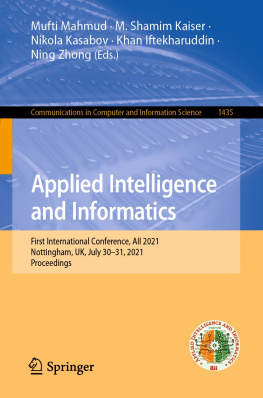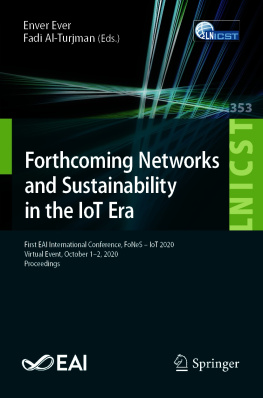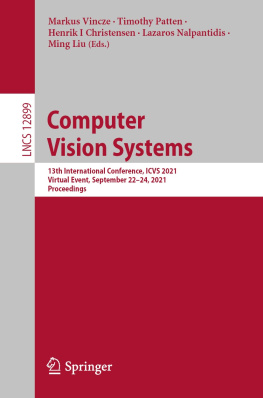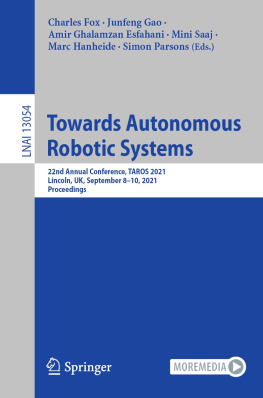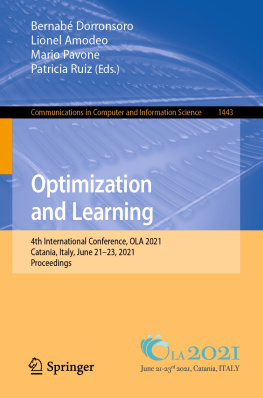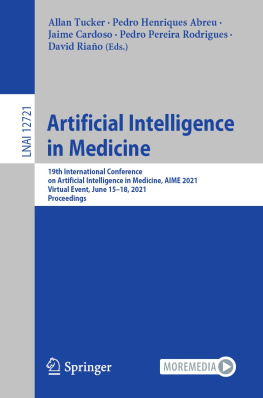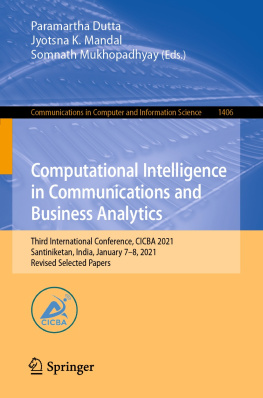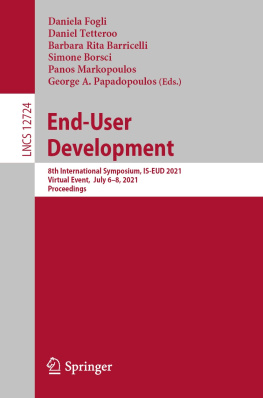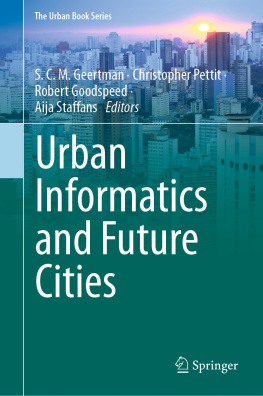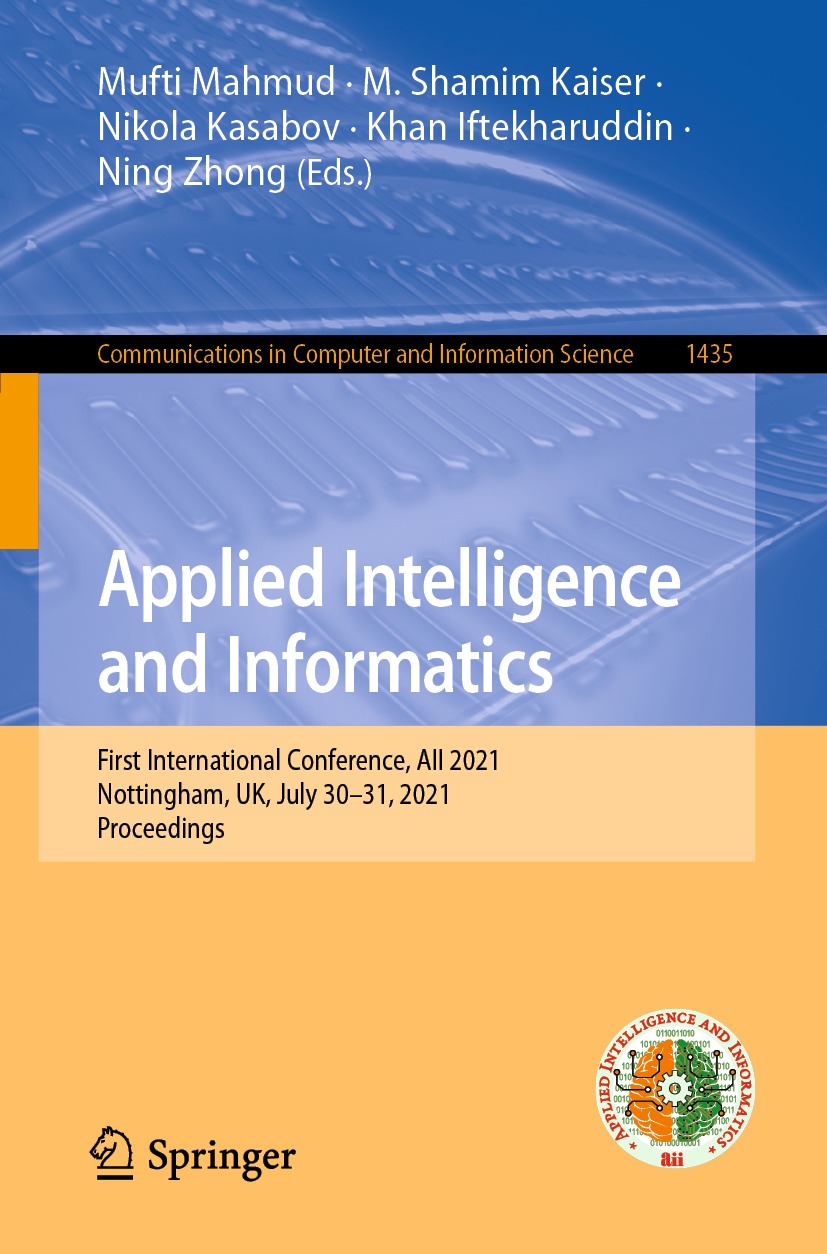Editors
Mufti Mahmud
Nottingham Trent University, Nottingham, UK
M. Shamim Kaiser
Jahangirnagar University, Savar, Dhaka, Bangladesh
Nikola Kasabov
Auckland University of Technology, Auckland, New Zealand
Khan Iftekharuddin
Old Dominion University, Norfolk, VA, USA
Ning Zhong
Maebashi Institute of Technology, Maebashi, Japan
ISSN 1865-0929 e-ISSN 1865-0937
Communications in Computer and Information Science
ISBN 978-3-030-82268-2 e-ISBN 978-3-030-82269-9
https://doi.org/10.1007/978-3-030-82269-9
Springer Nature Switzerland AG 2021
This work is subject to copyright. All rights are reserved by the Publisher, whether the whole or part of the material is concerned, specifically the rights of translation, reprinting, reuse of illustrations, recitation, broadcasting, reproduction on microfilms or in any other physical way, and transmission or information storage and retrieval, electronic adaptation, computer software, or by similar or dissimilar methodology now known or hereafter developed.
The use of general descriptive names, registered names, trademarks, service marks, etc. in this publication does not imply, even in the absence of a specific statement, that such names are exempt from the relevant protective laws and regulations and therefore free for general use.
The publisher, the authors and the editors are safe to assume that the advice and information in this book are believed to be true and accurate at the date of publication. Neither the publisher nor the authors or the editors give a warranty, expressed or implied, with respect to the material contained herein or for any errors or omissions that may have been made. The publisher remains neutral with regard to jurisdictional claims in published maps and institutional affiliations.
This Springer imprint is published by the registered company Springer Nature Switzerland AG
The registered company address is: Gewerbestrasse 11, 6330 Cham, Switzerland
Preface
The term Intelligence is defined as the ability to perceive or infer information, and to retain it as knowledge to be applied towards adaptive behaviours within an environment or context. It can be the capacity for logic, understanding, self-awareness, learning, emotional knowledge, reasoning, planning, creativity, critical thinking, and problem-solving. Informatics, on the other hand, is the study of the structure, behavior, and interactions of natural and engineered computational systems.It studies the representation, processing, and communication of information in natural and engineered systems. Applying both intelligence and informatics can be used to solve the most complex problems in science, engineering, real-life manufacturing, defence, management, government, and industrial domains.
The 2021 International Conference on Applied Intelligence and Informatics (AII 2021) brought together researchers and practitioners from diverse domains to share cutting-edge research results obtained through the application of intelligence and/or informatics to solve problems that it otherwise would not have been possible to solve. AII 2021 also fostered the exchange and dissemination of innovative and methodologies and the practical development of technologies with real-life applications.
The concept of the AII conference series was conceived last year when the whole world was combating the first wave of COVID-19. During that extremely challenging time, everyone, especially scientists and researchers from all disciplines, wanted to contribute in their own ways to this war against COVID-19. When cities and countries were going into lockdown, and universities and research labs were evacuated to stop the aggressive spread of the disease, computational scientists and researchers contributed significantly through developing different methods to detect and diagnose the disease, building models to help stop its spread, and facilitating the development of vaccines. However, most of these methods which were developed and published to fight the pandemic remained proprietary and had limited access for others to reproduce the results. Realising this, a set of committed academics felt the need for a dedicated avenue to discuss the reproducibility of research results through sharing the methods and the datasets. The AII conference series was born with a keen focus on the applications of Artificial Intelligence and Informatics, not only in the field of healthcare but also in all walks of life.
This first edition of AII was supposed to be held in Nottingham, UK; however, this was not possible due to the extenuating circumstances caused by COVID-19. This led to the organisation of the event in a fully virtual mode, with the hope that future editions will be held physically. The AII 2021 online conference was supported by the Applied Intelligence and Informatics (AII) Laboratory, the Web Intelligence Consortium (WIC), Nottingham Trent University, the IEEE Computational Intelligence Society UK and Ireland Chapter, and the International Academic Communication Center (IRNet).
The theme of AII 2021 was Fostering the Reproducibility of Scientific Results. The goal was to see how best we can promote open methodological contributions to reproduce the scientific results presented in the literature. The papers presented at AII 2021 addressed broad perspectives on applied research to facilitate the reproduction of results. These papers provide a good sample of state-of-the-art research advances on applications of artificial intelligence and informatics in diverse fields and disciplines. The selected papers cover five major tracks: (1) Application of AI in Disease Detection, (2) Application of AI in Healthcare, (3) Application of AI in Pattern Recognition, (4) Application of AI in Network, Security, and Analytics, and (5) Emerging Applications of AI and Informatics.
This first edition of the AII conference attracted 107 submissions from authors in 16 countries across all five AII 2021 tracks. The submitted papers underwent a single blind review process, soliciting opinion from at least three experts: a minimum of two independent reviewers and the handling chair. After the rigorous review process, reports from the reviewers and the track chairs on the respective papers were considered and, finally, 30 full papers from authors in 12 countries were accepted for presentation at the conference. Therefore, this volume of the conference proceedings contains those 30 papers which were presented virtually at AII 2021. Despite the COVID-19 pandemic situation, it was an amazing response from the community during this challenging time.

